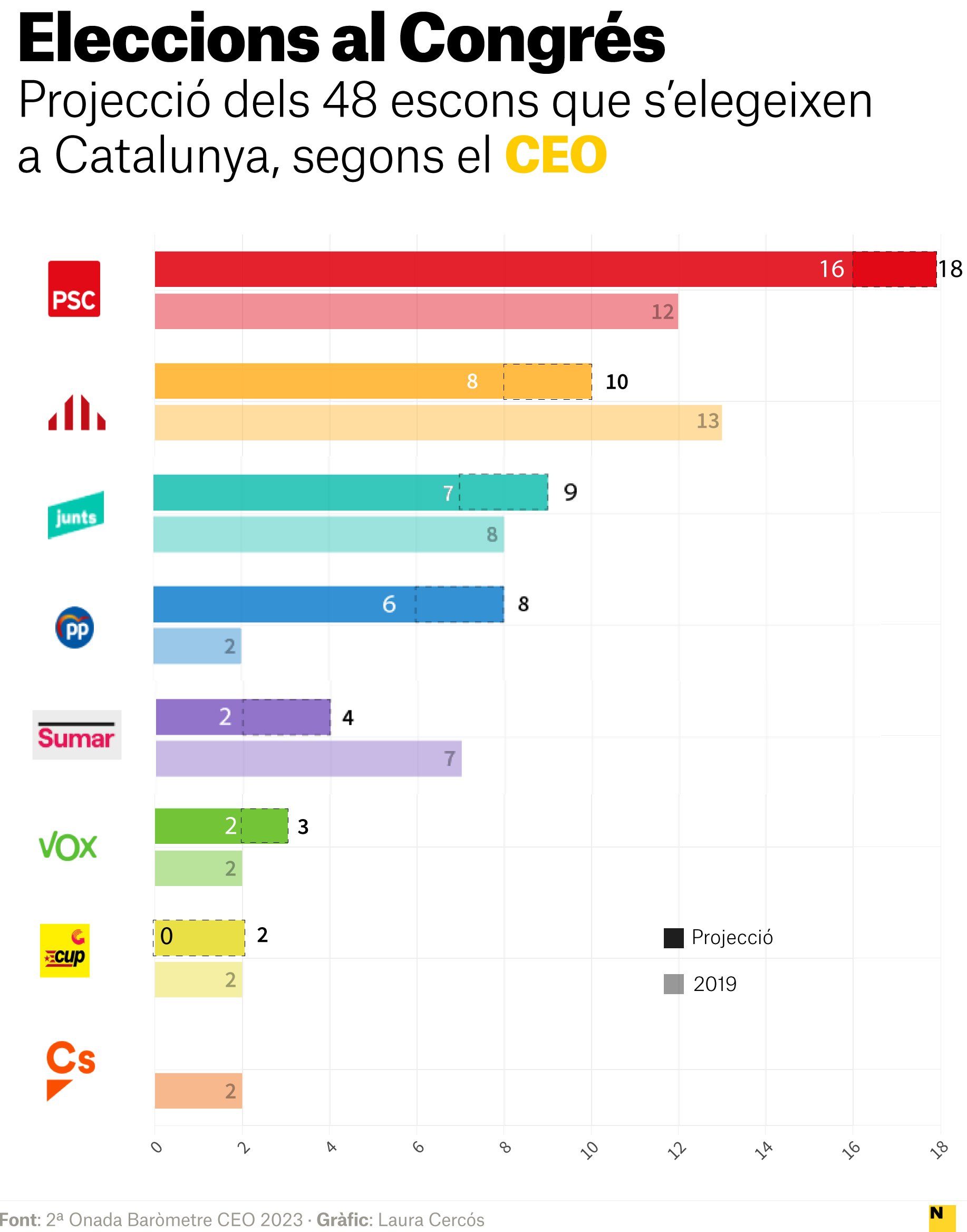Catalonia's public polling agency, the Centre for Opinion Studies (CEO) has revealed a return to the traditional "dual vote" pattern in Catalonia in its latest survey, released on the eve of the Spanish election campaign. On the one hand, there is the personality that the Catalan electorate presents when it votes for the Catalan Parliament - where the competition between the big three (Catalan Socialists, Republican Left and Junts) is close. On the other, is the way voters behave when they have to decide who to send to Madrid, and for this election on July 23rd, the most popular option in Catalan territory is clear: the Socialists. The survey gives an ample victory to the PSC list headed by Meritxell Batet, with the party winning 16-18 seats out of the 48 awarded from Catalonia in the Spanish lower house. In fact, the Socialists would win between 29 and 33% of votes. This strengthened position contrasts with the clear retreat of the Republicans, ERC: the candidacy led by Gabriel Rufián, who won the vote in Catalonia for the last Spanish election, in November 2019, and would fall to second place, dropping from the current 13 deputies to between 8 and 10 (15-18% of votes). In addition, both the People's Party (which would actually be third in percentage of votes, 12-16%) and Together for Catalonia (Junts), with 12-15%, could contest second place. Junts would be third in seats (7-9), while the PP are picked to take to 6-8 seats. Who's missing? The Comuns, in their new Sumar packaging, have taken a tumble, from their current 7 seats to an expectation of 2-4 in this survey.

Thus, the fall of Sumar-En Comú Podem is noteworthy. In 2019, Jaume Asens's list won 7 deputies. Now, Aina Vidal would win between 2 and 4 MPs (7-10%). The other group with representation would be Vox (which could continue with its two current deputies or grow to 3 representatives, with a percentage of 6 to 8% of votes) and the CUP could join them, but their entry into the Spanish parliament is marginal: they could retain their current seats or be left out (0-2, from 4 to 6% of ballots).
Some upward trends on the political left
The survey, based on 2,000 interviews between May 29th and June 26th, also presents a graph that shows the evolution of the vote percentage during the four weeks of field work. Three parties show clear upward trends in this time: the PSC (before the month of June, they were below 30% and by the end of the period were approaching 35%). Also on the left of the divide, and showing growth during the month, according to the study, is Sumar-En Comú Podem (they would now be above 10% when on May 29th they did not reach 7%) and, thirdly, the pro-independence CUP (until mid-June they did not reach 5% of the votes). Those who have remained where they were are ERC, Junts and Vox, who have stabilized in the vote percentages they had the day after the municipal elections. The party that has fallen over the month of June in Catalonia is the PP, which was clearly second at the end of May, reaching 17% of the vote in Catalonia; and now rates at 12% and in fourth place.
The effect of the dual vote: the PSC is the beneficiary
Since the July CEO survey predicts votes and seats in the Catalan Parliament and also in the Spanish Congress it has been able to detect the "dual vote" pattern, which has increased, with the Catalan Socialists being the great beneficiaries. This means that the vote that a Catalan would make in the Parliament of Catalonia may be different from the vote they would make for the elections to Congress. In the case of the Socialists - who are forecast to win, something that has not happened since the pre-independence movement era of 2008 - they would receive votes from 15% of people who vote for ERC in Parliament, 13% of those who vote for the Comuns and up to 27% of Cs voters.
Catalan independence, 'no' wins by 52% to 42%
Another question in the CEO poll asks Catalans whether they say 'yes' or 'no' to the independence of Catalonia. In this poll, the number of Catalans who says 'no' has grown again. This July study raises to 52% the percentage of the population that reject Catalonia being an independent state, two points more than the last, survey, three months ago. The pro-independence option has not been the winner since March 2019. The CEO history shows that 'yes' prevailed over 'no' between October 2017 (the month of the referendum) and March 2019. Since then, 'yes' has lost strength, with June 2022 the month when the lowest 'yes' figure was recorded (41%).
Regarding the independence of Catalonia, by party support, CUP voters are the most in favour of an independent state (88%), while those of ERC and Junts are tied at 82%. Of the Comuns, one in three of their voters are in favour of independence. As for those who lean towards 'no', there are 60% of Comuns voters; 84% of the PSC and 92% and 93% of Vox and PP, respectively.


